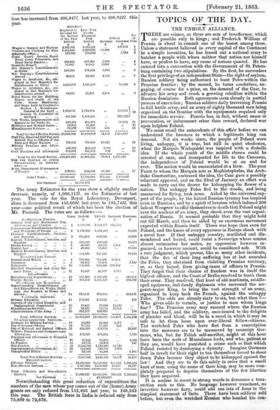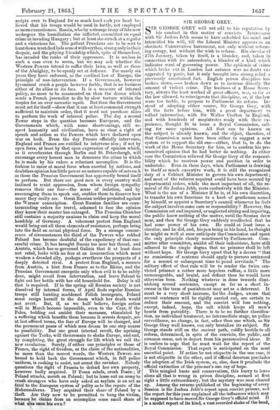TOPICS OF THE DAY.
THE UNHOLY ALLIANCE. THERE are crimes, as there are acts of beneficence, which are possible only to kings ; and Frederick William of Prussia is about to commit one of the basest among them. Unless a statement believed in every capital of the Continent be a simple invention, he has leased out a national army to butcher a people with whom neither that nation nor himself have, or profess to have, any cause of serious quarrel. He has entered into a convention with the Government of St. Peters- burg containing two stipulations. By the first, he surrenders the first privilege of an independent State-the right of asylum, Russian soldiery being authorized to hunt Poles'within the Prussian frontier; by the second, he turns condottiere, en- gaging, of course for a price, on the demand of the Czar, to advance his army and crush a growing rebellion within the Russian dominions. Both agreements seem already in partial process of execution ; Russian soldiers daily traversing Prussia in full battle array, and an army of eighty thousand men being organized on the frontier with the equipments required only for immediate service. Prussia has, in fact, without cause or provocation, or inducement other than reward, declared war upon helpless Poland. We must recall the antecedents of this affair before we can understand the baseness to which a legitimate king can descend. Not six weeks since, the people of Poland were living, unhappy, it is true, but still in quiet obedience, when the Marquis Wielopolski was inspired with a diabolic idea. If the whole youth of the middle classes could be arrested at once, and transported for life to the Caucasus, the independence of Poland would be at an end for ever. The nation would be emasculated at a blow. The poor Faust to whom the Marquis acts as Mephistopheles, the Arch- duke Constantine, embraced the idea, the Czar gave a possibly reluctant approval, and on the 22nd of January an effort was made to carry out the decree for kidnapping the flower of a nation. The unhappy Poles fled to the woods, and being massacred for flying, took arms. Aided by the universal sup- port of the people, by the hatred Russian tyranny has inspired even in Russians, and by a spirit of heroism which induced 200 lads at Wengrow to offer themselves to death that Poland might save the nucleus of an army, they shook even the vast organi- zation of Russia. It seemed probable that they might hold out till March, and then be aided by an enormous movement expected within Russia itself. There was hope then even for Poland, and the knees of every oppressor in Europe shook with a novel fear. If that unhappy country, mutilated and dis-. membered and bound, could resist a Sovereign whose armies, almost outnumber her males, no oppression however or- ganized, or however ancient, could be considered safe. With a rare judgment, which proves, like so many other incidents, that the fire of their long suffering has at last annealed the Poles, they abstained from violating Prussian territory, as they hoped, from giving cause of offence to Prussia. They forgot that their chance of freedom was in itself the highest offence, and the Court of Berlin resolved to teach them their error. They resolved, that knot of old martinets, middle- aged squireens, and dandy. diplomats who surround the ser- geant-major King, to bring the vast strength of an army, organized to keep back the French, against the unhappy Poles. The odds are already sixty to six, but what then ?- Who gives odds to vermin, or justice to men whom kings fear ? The Prussian army may succeed where the Russian army has failed, and the soldiery, once inured to the delights of plunder and blood, will be in a mood in which it may be safe to let them loose upon over-liberal fellow-citizens. The wretched Poles who have fled from a conscription into the morasses are to be massacred by conscript Ger- mans, who, but for Polish self-sacrifice, might at this hour have been the serfs of Mussulman lords, and who, patient as they are, would have punished a crime such as that which Poland resisted by destroying a dynasty. Imagine Germans half in revolt for their right to tax themselves forced to shoot down Poles because they object to be kidnapped against the law ! And they are to do this solely in order that a small knot of men, using the name of their king, may be more com- pletely prepared to deprive themselves of the few liberties they have acquired. It is useless to resort to strong words to denounce a tran- saction such as this. No language however trenchant, no invective however fiery, could add one iota of force to the simplest statement of facts. There have been soldiers sold before, but even the wretched Hessian who handed his con- scripts over to England for so much hard cash per head be- lieved that his troops would be used in battle, not employed as mere executioners. Russia, who by a strange irony of fate now undergoes the humiliation she inflicted, committed an equal crime in invading Hungary ; but at least she struck at a regular and a victorious foe. The gallant Prussians are to be sent to huntdown wretched lads armed with scythes, strong only in their despair, and the pitying friendship which, spite of themselves, has invaded the ranks of their oppressors. It is useless in such a case even to scorn, but we may ask whether the Western Powers intend to suffer their laws, as well as those of the Almighty, to be openly set at defiance. For nearly six years they have enforced, as the cardinal law of Europe, the principle of non-intervention. If a Government, however tyrannical crush a people however feeble, that is no business either of its allies or its fees. It is a measure of internal policy, no more to be commented on than the decree which sends a French journalist to die by slow torture within the tropics for an over sarcastic squib. But then the Government must act for itself—show that it can at least command strength sufficient to maintain order, that it need not purchase allies to perform the work of internal police. The day a second Power steps in the question becomes European, and the Governments which, with some shortcomings, still re- spect humanity and civilization, have as clear a right of speech and action as the Powers which have declared open war on both. From the day Prussia officially intervenes, England and France are entitled to intervene also ; if not by open force, at least by that open expression of opinion which, as it reverberates through Berlin and St. Petersburg'', will encourage every honest man to denounce the crime in which he is made by his rulers a reluctant accomplice. It is the fashion to sneer at moral force when exerted by nations, and doubtless opinion has little power on natures capable of actssuch as those the Prussian Government has apparently bound itself to perform. But there 'are good men in every country well inclined to resist oppression, from whom foreign sympathy removes their one fear—the sense of isolation, and by encouraging them to speak out, enables them to discover how many they really are. Great Russian nobles protested against the Warsaw conscription. Great Russian families are coun- termanding orders for travel, ashamed to face the opinion they know their master has outraged. The Prussian Chamber 'still contains a majority anxious to claim and keep the moral headship of Germany. A vehement protest from England would bring out all these elements of-resistance, perhaps bring into the field an actual physical force. By a strange concur- rence of circumstances the third of the Powers who robbed Poland has become doubtful of the expediency of that suc- cessful crime. It has brought Russia too near her throat, and *Austria, which has so governed Galicia that it at least does not rebel, looks with no fear at an insurrection which must weaken a dreaded ally, perhaps overthrow the prospects of a deeply detested rival. A. protest from England, a menace from Austria, a hint from France as to the Rhine, and the Prussian Government energetic only when evil is to be safely ' done, might recoil from intervention, and leave Poland to fight out her battle with her old household foe. Delay is all . that is required. If in the spring all Russian society is not dissolved by internal forces, if April finds regular Russian troops still hunting maddened Polish insurgents, Poland must resign herself to the doom which her death would not avert. But, if, as we half believe, foreign action will, in March become impossible, even to the Czar, if the Poles, holding out amidst their morasses, stimulated by a suffering which benefits them because it arrests despair, are at last offered terms, the face of Europe will be changed, and the permanent peace of which men dream be one step nearer to possibility. But one great internal revolt, the uprising aeainst the Turks, will thenremain to shake Europe, and end, by completing, the great struggle for life which we call the new revolution. Surely, if either our principles or those of Prance, the right of freedom, or the claim of the nationalities, be more than the merest words, the Western Powers are bound to hold back the Government which, in full police 'uniform, is rushing to assist, not arrest the ravisher. Nobody questions the right of Prussia to defend her own property, 'however badly acquired. If Posen rebels, crush Posen ; if "Poland attacks, march on Poland ; but to lease out an army to crush strangers who have only asked an asylum is an act as fatal to the European system of polity as to the repute of the Rohenzollerns. They acquired their share of Poland by a 'theft. Are they now to be permitted to hang the victim, because he, claims from an accomplice some small share of what ssias once his own?































 Previous page
Previous page